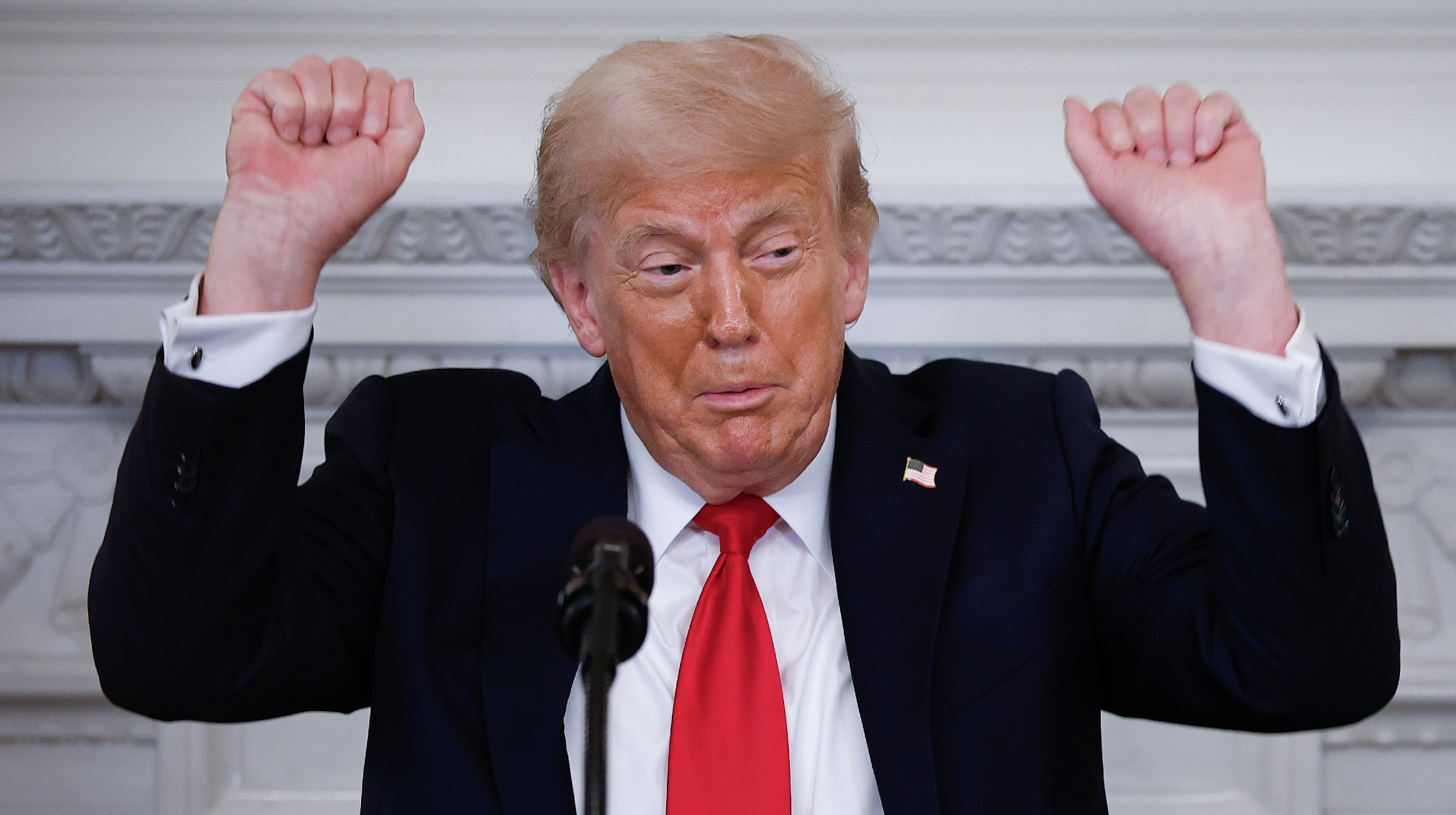Agent Orange's shameful legacy
Four decades after the Vietnam War ended, the U.S. government is finally cleaning up the toxic mess it left behind

What is Agent Orange?
Named for the orange-striped barrels in which it was shipped, Agent Orange is an herbicide that the U.S. military used during the Vietnam War to destroy enemy food crops and kill jungle vegetation that concealed North Vietnamese forces. Beginning in 1961, U.S. and South Vietnamese forces sprayed 20 million gallons of it and other herbicides over vast areas of South Vietnam and parts of Laos and Cambodia. The spraying denuded more than 8,600 square miles of jungle and cropland. The U.S. military stopped using Agent Orange in 1971 after the National Institutes of Health found that it contained a chemical contaminant that caused birth defects in lab animals. By then, hundreds of thousands of U.S. soldiers and millions of Vietnamese civilians had been in contact with the stuff, many of them so oblivious to its dangers that they bathed in water stored in the empty barrels.
How toxic is it?
Subscribe to The Week
Escape your echo chamber. Get the facts behind the news, plus analysis from multiple perspectives.

Sign up for The Week's Free Newsletters
From our morning news briefing to a weekly Good News Newsletter, get the best of The Week delivered directly to your inbox.
From our morning news briefing to a weekly Good News Newsletter, get the best of The Week delivered directly to your inbox.
Agent Orange contained the dioxin TCDD, one of the most toxic chemicals ever manufactured. Dioxin remains in the soil and in the body for decades, and studies have linked it to numerous cancers and birth defects, as well as neurological illnesses like Parkinson's disease. "It has widespread effects in nearly every vertebrate species at nearly every stage of development," said Dr. Linda Birnbaum, director of the National Institute of Environmental Health Sciences. During the war, Vietnamese doctors began delivering babies born with no limbs, no eyes, or even no brain. Even now, said Vietnamese obstetrician Dr. Nguyen Thi Ngoc Phuong, the breast milk of mothers in areas sprayed with Agent Orange 40 years ago contains dangerously elevated levels of dioxin. "It is a cruel destroyer of all life in my country," she said.
How many Vietnamese are affected?
Between 2.1 million and 4.8 million Vietnamese were exposed to dioxin during the war, according to the American Public Health Association, but it's unknown how many of their children have ailments resulting from that exposure. Dioxin has been associated with human birth defects, but no large-scale study has proved that it causes them; activists say that is only because no such study has been done. What is clear, though, is that the rate of birth defects in Vietnam has quadrupled since the war, and that most of them occur where Agent Orange was sprayed or stored. Vietnamese scientists blame dioxin contamination for a broad range of birth defects, from blood disorders to clubfeet.
What is the U.S. stance?
A free daily email with the biggest news stories of the day – and the best features from TheWeek.com
The U.S. government has never acknowledged a link between Agent Orange and illness in the Vietnamese population. U.S. officials say there could be many other reasons for congenital deformities, including iodine deficiency, malnutrition, and alcoholism. Under its "Agent Orange Fast Track Claims Processing System," the U.S. Department of Veterans Affairs awards compensation to Vietnam vets who suffer from more than a dozen ailments, from leukemia to heart disease, or whose children have certain birth defects, including spina bifida. But it does not explicitly concede that those disorders were caused by Agent Orange exposure. In 2010 alone, the VA spent $16 billion on medical compensation to U.S. Vietnam vets. But before announcing a cleanup project earlier this year, Washington had given a tiny fraction of that sum — $54 million since the war — to assist Vietnam in caring for victims or cleaning up dioxin.
What does the cleanup entail?
The U.S. will spend $44 million over the next four years to remove dioxin residues around the former U.S. airbase in Danang, where most Agent Orange barrels were stored. Some 2.5 million cubic feet of soil and sediment around the airport will be dug up and heated to very high temperatures, breaking down the toxic compounds. These are "the first steps to bury the legacies of our past," said U.S. Ambassador David Shear. The U.S. has identified two other former bases for cleanup, but Canadian and Vietnamese scientists say there are some two dozen "hot spots" where dioxin is particularly concentrated. Earlier this year, a U.S.-Vietnamese dialogue group sponsored by the Ford Foundation and the Aspen Institute called for $410 million in further spending by 2017, three quarters of it for social and medical services for affected Vietnamese people. But no more government funds have yet been promised.
Why is the cleanup happening now?
Because it has finally become politically possible — and strategically useful — for the U.S. to address the issue. The U.S. and Vietnam didn't resume diplomatic relations until 1995, and U.S. concerns over liability have made discussions on Agent Orange since then slow and difficult. In the past few years, though, Washington has found good reason to cooperate more closely with Vietnam. The Navy is shifting its emphasis from the Atlantic to the Pacific, and the U.S. seeks an ally in Vietnam, which is increasingly unsettled by China's claims over the oil-rich South China Sea. "The U.S. and Vietnam are set to take their bilateral ties to new heights," said U.S. Secretary of Defense Leon Panetta. Doing so calls for visible U.S. action to address Agent Orange's lingering effects.
The ongoing battle of Vietnam vet
Not just the Vietnamese have been unhappy with the U.S. military's reluctance to own up to the damage wrought by Agent Orange. Many Vietnam veterans are too. For years, the U.S. military, citing research by Dow Chemical, which produced much of the herbicide, denied any link between exposure and veterans' illnesses. In 1991, Congress passed the Agent Orange Act, which lists more than a dozen cancers and other illnesses for which the VA must compensate veterans. But veterans groups say the VA takes years to process their claims, and many vets die before they see the money. Of the nearly 500,000 Vietnam veterans who died from 2000 to 2007, 58 percent were younger than 60. "The mantra of the VA," said Paul Sutton, former chairman of Vietnam Veterans of America, "is delay, delay, delay, until they all die."
-
 5 cultural trails to traverse by car
5 cultural trails to traverse by carThe Week Recommends Leave the hiking shoes at home
-
 Could Iran's water crisis be the regime's tipping point?
Could Iran's water crisis be the regime's tipping point?Today's Big Question Drought is a problem. So is government mismanagement.
-
 Trump revives K-12 Presidential Fitness Test
Trump revives K-12 Presidential Fitness TestSpeed Read The Obama administration phased the test out in 2012, replacing it with a program focused on overall health rather than standardized benchmarks
-
 Ghislaine Maxwell: angling for a Trump pardon
Ghislaine Maxwell: angling for a Trump pardonTalking Point Convicted sex trafficker's testimony could shed new light on president's links to Jeffrey Epstein
-
 The last words and final moments of 40 presidents
The last words and final moments of 40 presidentsThe Explainer Some are eloquent quotes worthy of the holders of the highest office in the nation, and others... aren't
-
 The JFK files: the truth at last?
The JFK files: the truth at last?In The Spotlight More than 64,000 previously classified documents relating the 1963 assassination of John F. Kennedy have been released by the Trump administration
-
 'Seriously, not literally': how should the world take Donald Trump?
'Seriously, not literally': how should the world take Donald Trump?Today's big question White House rhetoric and reality look likely to become increasingly blurred
-
 Will Trump's 'madman' strategy pay off?
Will Trump's 'madman' strategy pay off?Today's Big Question Incoming US president likes to seem unpredictable but, this time round, world leaders could be wise to his playbook
-
 Democrats vs. Republicans: which party are the billionaires backing?
Democrats vs. Republicans: which party are the billionaires backing?The Explainer Younger tech titans join 'boys' club throwing money and support' behind President Trump, while older plutocrats quietly rebuke new administration
-
 US election: where things stand with one week to go
US election: where things stand with one week to goThe Explainer Harris' lead in the polls has been narrowing in Trump's favour, but her campaign remains 'cautiously optimistic'
-
 Is Trump okay?
Is Trump okay?Today's Big Question Former president's mental fitness and alleged cognitive decline firmly back in the spotlight after 'bizarre' town hall event